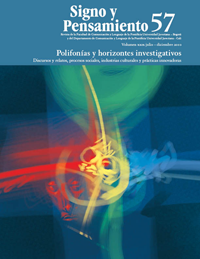Abstract
The gathering of multiple individuals dealing with different knowledge subject matters constitutes an enormous potential for any university. If this encounter is really translated into a lively academic community, the manifest result would be a condition of possibility whereby knowledge and information can be created, recreated, and given new meanings. Thus, research on or within communication, is in urgent need of links and shared languages: research requires reducing dispersion and facilitating conversation, dialogue, socialization, and publications. A project, i.e., a clear research line and program, requires an educational environment where to be and to talk together foster the emergence of dissent and consensus, of new theories and sciences. Still, in the context of universities and higher education, research is not only a question of what and how, it is also a question of why do we do research for.
Bauman, Z. (2005), Modernidad líquida, Buenos Aires, FCE.
Beck, U. (1997), Modernización reflexiva, Madrid, Alianza Universidad.
— (2004), Poder y contrapoder en la era global, Barcelona, Paidós.
— (2005), La mirada cosmopolita o la guerra es la paz, Barcelona, Paidós.
Beriain, J. (2004), Modernidades en disputa, Barcelona, Anthopos.
Butler, J.; Laclau, E., y Žižek, S. (2004), Contingencia, hegemonía, universalidad, Buenos Aires, fce.
Ceberio, M. y Watzlawick, P. (1998), La construcción del universo, Barcelona, Herder.
Fazio, H. (2006, abril), “La historia global: ¿encrucijada de la contemporaneidad?”, en Revista de Estudios Sociales, núm. 23.
Foester, H. von (1996), Las semillas de la cibernética, Barcelona, Gedisa.
Giddens, A. (1993), Consecuencias de la modernidad, Madrid, Alianza.
Giddens, A. et al. (1996), Las consecuencias perversas de la modernidad, Barcelona, Anthropos.
Heidegger, M. (1977), El ser y el tiempo, México, fce.
Hobsbawm, E. (2003), Historia del siglo xx, Barcelona, Crítica. Marín Ardila, L. F. (2000, abril-septiembre), “Sujeto, subjetivación y formación pedagógica”, Investigación Educativa y Formación Docente, núms. 5-6, Facultad de Educación, Universidad El Bosque.
— (2007), “Nuevo sensorium. Imágenes en Walter Benjamin”, Pro-Posiçôes, vol. 18, núm. 3, Facultad de Educación, Universidad de Campiñas.
Martín-Barbero, J. (1991), “De la comunicación a la cultura: perder el ‘objeto’ para ganar el proceso”, Signo y Pensamiento, vol. 10, núm. 18.
— (2007), Líneas de investigación, Facultad de Comunicación y Lenguaje y Agenda País, Bogotá, Facultad de Comunicación y Lenguaje, Pontificia Universidad Javeriana.
Mattelart, A. (1997), “La institucionalización de los estudios de la comunicación. Historia de los cultural studies”, Telos, núm. 49.
Miége, B. (1996), El pensamiento comunicacional, México, Universidad Iberoamericana.
Ortiz, R. (2002), “Globalización, esfera pública, transformación cultural”, Signo y Pensamiento, vol. 21, núm. 41.
Robertson, R. (2005), Tres olas de globalización. Historia de una conciencia global, Madrid, Alianza.
Wallerstein, I. (2005), Las incertidumbres del saber, Barcelona, Gedisa.
This journal is registered under a Creative Commons Attribution 4.0 International Public License. Thus, this work may be reproduced, distributed, and publicly shared in digital format, as long as the names of the authors and Pontificia Universidad Javeriana are acknowledged. Others are allowed to quote, adapt, transform, auto-archive, republish, and create based on this material, for any purpose (even commercial ones), provided the authorship is duly acknowledged, a link to the original work is provided, and it is specified if changes have been made. Pontificia Universidad Javeriana does not hold the rights of published works and the authors are solely responsible for the contents of their works; they keep the moral, intellectual, privacy, and publicity rights.
Approving the intervention of the work (review, copy-editing, translation, layout) and the following outreach, are granted through an use license and not through an assignment of rights. This means the journal and Pontificia Universidad Javeriana cannot be held responsible for any ethical malpractice by the authors. As a consequence of the protection granted by the use license, the journal is not required to publish recantations or modify information already published, unless the errata stems from the editorial management process. Publishing contents in this journal does not generate royalties for contributors.


